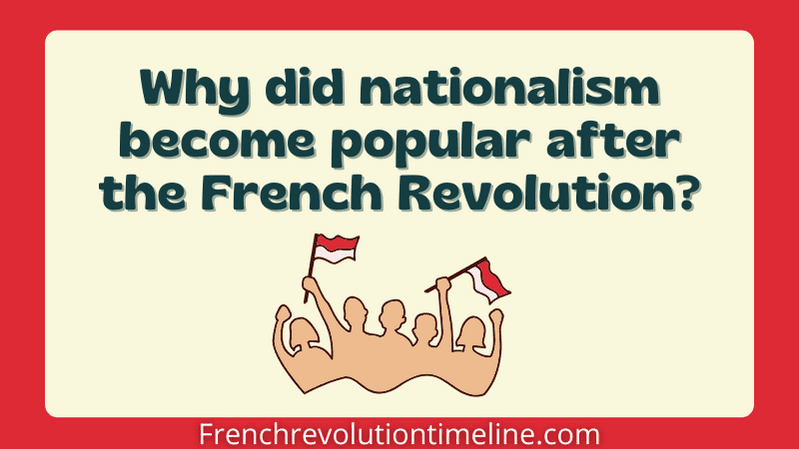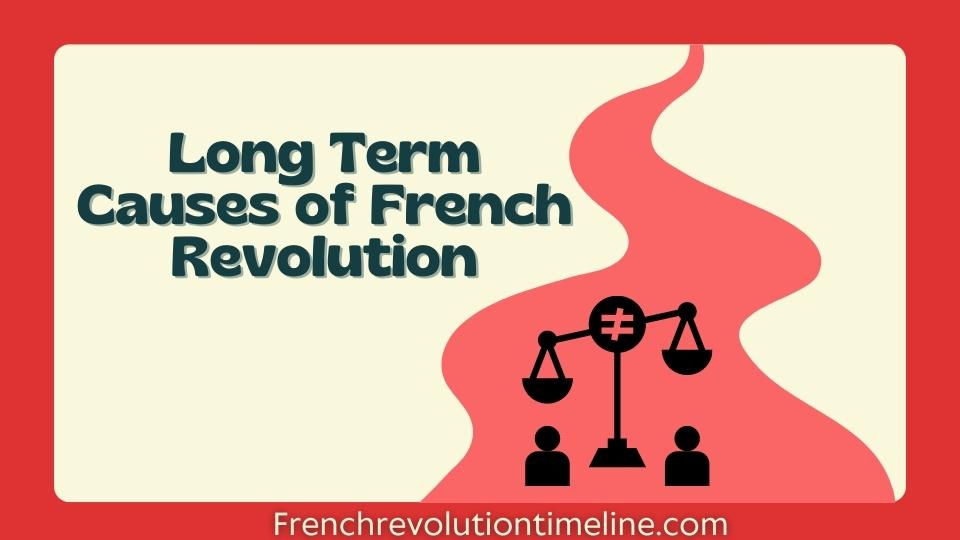By restructuring France’s governmental system, introducing rights for its citizens, and establishing national symbols like the tricolor flag, the revolution set off a wave of change that reverberated far beyond French borders. This period of intense socio-political change helped spread nationalist sentiments beyond France’s borders.
The French Revolution wasn’t just a pivotal chapter in history; it was a profound transformation that echoed across continents, sparking nationalist movements. Initially celebrated for promoting liberty and ending feudalism. Yet, as the tide turned, it became a lesson in the complexities of freedom and governance.
Remarkably, the Revolution’s aftermath saw a surge in nationalism, a sentiment that had been simmering but found its voice in the chaos and ideals of the period. Leaders, striving to unite the nation, unintentionally fostered nationalism by prioritizing unity and national borders’ integrity.
This era marked the beginning of nationalism’s rise, reshaping political landscapes worldwide.
Let’s delve deeper into how exactly the French Revolution catalyzed this phenomenon.
What led nationalism to become popular after the French Revolution?

Political Changes Leading to Nationalism
As I delve deeper, it becomes increasingly apparent how the political transformations acted as catalysts for the surge in nationalism.
1. Abolition of Monarchies
One of the most significant changes was the Abolition of Monarchies. At the heart of the French Revolution was a vehement rejection of the absolute monarchy that had ruled France for centuries.
The National Assembly’s bold actions, including the Declaration of the Rights of Man and of the Citizen, not only signaled an end to feudalism but also challenged the right of kings. This idea that sovereignty did not belong to a monarch but to the nation itself was revolutionary.
The immediate aftermath saw the execution of Louis XVI, which sent shockwaves across Europe. Other monarchies viewed this as a threat to their existence, yet it inspired people across the nations to challenge their own oppressive rulers.
The downfall of these monarchies was not just a transfer of power but a complete shift of where power should reside. It paved the way for the establishment of republics and constitutional monarchies, granting a voice to the people.
2. Establishment of Nation-States
The rise of Nation-States marked a significant turning point. Before the French Revolution, Europe was a complex mix of kingdoms, duchies, and empires where rulers were often out of touch with the cultural identities of their people.
The Revolution’s notion of national self-determination introduced the concept that boundaries of states should align with the boundaries of nations.
This alignment was not an overnight process but a complex evolution. The Revolutionary Wars and the Napoleonic Wars, while initially fought to defend or spread revolutionary ideals, unintentionally nurtured a sense of national unity within the occupied territories. People began to see themselves not just as subjects of a monarch, but as part of a national community with common interests, language, and culture.
The transformation was stark in places like Germany and Italy, which once divided into multiple princely states. The spread of nationalist ideas contributed to their eventual consolidation in the 19th century. Even in France, where the idea of a unified nation was more established, the Revolution reinforced the concept of a French identity separate from the monarchy.
These political changes were vital in the rise of nationalism. The abolition of monarchies uprooted centuries-old structures, while the establishment of nation-states provided a new model for political organization based on the common identity of the people.
This period set the foundation for the modern understanding of nationhood, sovereignty, and the right to self-determination.
Socio-Cultural Factors of Nationalism
1. Cultural Pride and Heritage
It is not possible to overlook the immense influence of Cultural Pride and Heritage. The revolution wasn’t just a political upheaval; it was a seismic cultural shift that inspired a renaissance of French identity. How the abolition of the monarchy and the establishment of a republic empowered people to redefine what it meant to be French.
This wasn’t merely about changing political allegiances; it was about reclaiming a sense of ownership over French culture, traditions, and values that had been, in the eyes of many, suppressed or undervalued under the monarchy.
The Revolution’s promotion of secularism and its move to diminish the power of the Church played a significant role here. For centuries, the Church had been intertwined with the monarchy, often acting as a gatekeeper of culture and morality.
With its influence waning, French citizens found themselves free to explore and express their cultural identity in new, secular ways. The ripple effect of this cannot be understated; it led to an explosion of national pride that was deeply intertwined with cultural expression, from the arts to the way history was remembered and celebrated.
2. Language and Literature
Another pillar supporting the rise of nationalism post-Revolution was the elevation of the French language.
Before the Revolution, France was a patchwork of dialects and languages, with French not even spoken by the majority of the populace. The push for a standardized French language during and after the Revolution was not just a practical move for administrative efficiency; it was a deliberate effort to foster a clear national identity.
The elevation of French as the national language served to unite disparate groups under a single banner of cultural and national unity. It was a powerful tool for inclusion, flattening regional differences and making citizens feel part of a broader, cohesive whole.
Moreover, the period following the Revolution saw a significant uptick in literacy and a booming interest in literature that reflected, critiqued, and celebrated the nation’s journey.
Writers like Victor Hugo and Alexandre Dumas emerged, whose works not only became symbols of French literary prowess but also vehicles for exploring and instilling a sense of national pride and identity.
Their narratives often weaved in themes of liberty, struggle, and solidarity that resonated deeply with the French public, further embedding the ideals of the Revolution into the national consciousness.
Through both cultural pride and the strategic use of language and literature, France experienced a dramatic transformation in how its people viewed themselves and their connections to each other. These socio-cultural factors played critical roles in the popularization of nationalism, showing just how deeply political change is interwoven with cultural shifts.
Impact of French Revolution on Nationalism
Let’s delve deeper into how exactly the French Revolution catalyzed this phenomenon.
Rise of National Identity
Before the French Revolution, loyalty often lay with monarchs or regional lords rather than with a nation. The concept of a “people’s state,” introduced by the Revolution, underscored the importance of a collective national identity.
Revolutionary France’s initial acts, such as the Declaration of the Rights of Man and of the Citizen, spotlighted individual freedoms and the well-being of its people as a whole. This shift towards recognizing and prioritizing a collective national identity encouraged people across continents to envisage themselves as part of a larger national community.
National identity became a banner under which people could unite, inspired by the example set by Revolutionary France. This shift wasn’t just ideological; it manifested in the widespread adoption of national symbols, anthems, and holidays that celebrated a shared national heritage and future.
Emphasis on Sovereignty
The French Revolution brought the concept of sovereignty to the forefront. Sovereignty, in this context, refers to the full right and power of a governing body over itself, without any interference from outside sources or bodies.
The Revolution made clear that sovereignty belonged to the nation, derived from the will of the people, rather than being a divine right of kings.
This marked a big change from the old feudal and royal systems in Europe. By getting rid of feudalism and setting up a republic, France showed that a country could govern itself, setting the stage for modern democracy.
The will of the people became paramount, and this idea of self-determination and sovereignty fueled nationalist movements across Europe and beyond. Countries and territories under foreign rule or monarchical control saw in the French example a path to their own self-governance.
Spread of Revolutionary Ideas
The French Revolution did not keep its ideas within its borders; they spread across Europe and later the world, carried by wars, trade, and the written word. Revolutionary ideals, encapsulated in texts like the Declaration of the Rights of Man and of the Citizen, found audiences far beyond France.
These ideas inspired uprisings, reforms, and the establishment of nationalist movements seeking similar freedoms and rights for their peoples.
Nations aspired to mirror France’s transition from monarchy to a republic, igniting movements for independence and the formation of nation-states. The spread of revolutionary ideas was not just a transfer of ideologies but a transformative force that reshaped the political and social landscapes of the 19th century.
Countries such as Germany, Italy, Greece, and Poland were significantly influenced, leading to the unification or formation of new nation-states.
The French Revolution, with its spread of national identity, sovereignty, and revolutionary ideas, served as a pivotal force for the global rise of nationalism. This era highlighted the power of collective identity and self-determination, principles that continue to shape national movements and political debates today.
Conclusion
The French Revolution wasn’t just a political upheaval; it was a cultural renaissance that breathed life into nationalism. The mix of cultural pride, heritage, and the rise of secularism played crucial roles in this transformation.
The empowerment of the French language and literature not only unified the people but also instilled a deep-seated sense of national pride.
This period marked a significant shift where the public began to see themselves not just as subjects of a monarchy but as part of a nation with shared values and aspirations. It’s clear that the roots of modern nationalism are deeply embedded in the socio-cultural changes that followed the French Revolution, illustrating how cultural evolution can drive political and national identity.
Related Posts:




